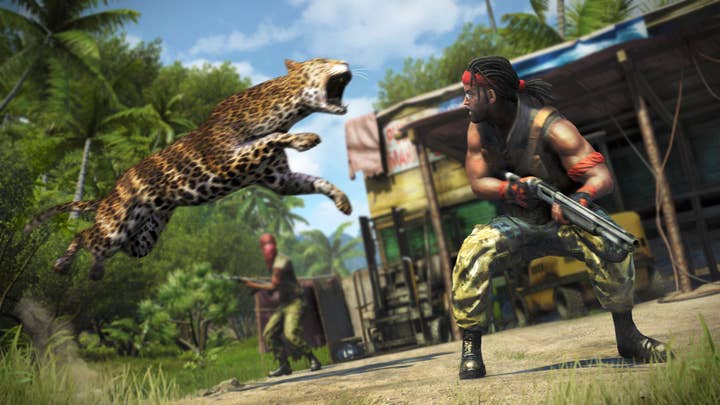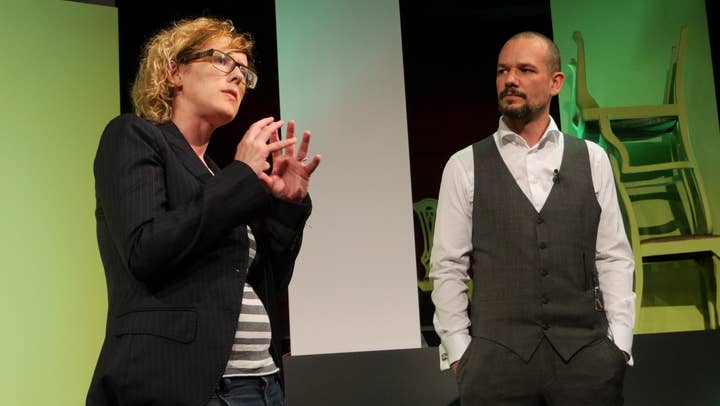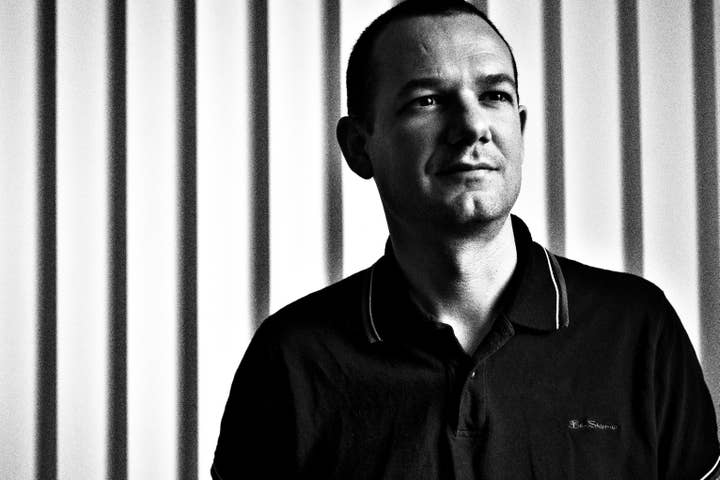"Success buys freedom. It's really just as simple as that"
Massive Entertainment's David Polfeldt on Ubisoft, F2P and new technology
Who'd be who in the industry's Game of Thrones? Could Nintendo be the cash-rich Lannisters, or would Valve's king-slaying tendencies make it more apt? Which savvy but nefarious CEO would be your Littlefinger? At very least, I'm sure we all have a couple of potential individuals lined up for the role of Joffrey, even if we don't want to call them out publicly.
The thing is, as in George RR Martin's epic, success in the games industry has always come with an inherent risk, justified or not, of being considered evil, dictatorial or oppressive. It's much easier to win hearts as a plucky indie Arya Stark than it is when you're sitting pretty at the top of the food chain, an army of thousands at your right hand. Over recent years, we've seen that dichotomous pendulum of success and inversely correlated customer sentiment swing across a few fronts, at all levels. Microsoft and Sony. Full priced and free-to-play. Casual and hardcore. EA and Activision.
For Ubisoft, that final conflict has been the most relevant. The French publisher has been a solid third place in the arena of AAA publishers for a few years now, earning kudos among critics and customers alike for its broad base of IP and willingness to engage with more experimental titles. Meanwhile, EA and Activision have been busy, in the eyes of some gamers at least, playing hotseat on the iron throne of gaming's 'evil emperors'. I should hasten to add that I don't think either company deserves to be thought of as evil at all, but I think it'd be hard to argue that everyone shares that sentiment.
By and large, Ubisoft has managed to avoid that taint. Concerns about DRM aside, Ubisoft seems to have managed the tight-rope between success, creative experimentation and public opinion with considerable success. Now though, with the publisher looking more and more like it's ready to graduate to that top spot, with a heady mix of annualised blockbusters and quirky projects on its books, it's more important than ever to maintain its balancing act.

Malmo's Massive Entertainment was acquired by Ubisoft in 2008 - picked up after Activision sold it off in a Red Wedding of a 'structural reorganisation'. Since then it has collaborated closely on two major IPs for its new owner, Assassin's Creed and Far Cry, and has now been given the reins to a third: the Tom Clancy meta-brand in the shape of The Division. With concerns about the homogenisation of Ubisoft's AAA games surfacing over some familiar aspects of Watch_Dogs, is MD David Polfeldt worried that his vision for the ambitious 2015 blockbuster will be sanitised by the pressures of Ubisoft's broad church? Not in the slightest, he says. Creative freedom is alive, well and celebrated at the multinational - you simply have to earn it.
"I think that there's a very normal trick that you have to master in Ubisoft, but if you master it well, you get a lot of freedom," he explains to me after his opening keynote at Nordic Game 2014. "It's striking the right balance between service-minded and autonomous. If you can dial that in as a developer, it's an extremely creative environment because usually when you meet upper management, it's always about the quality of the game, the entertainment value, the story, the character. How do we know that this is what consumers what? How are you testing this? How are validating your assumptions?
"It's always about production velocity and production quality, and quality from the perspective of the gamer, really. Is this fun? A basic question."
"It's always about production velocity and production quality, and quality from the perspective of the gamer, really. Is this fun? A basic question. I think what we did with Massive was we understood that sometimes you need to be just service-minded. Can you help us on Far Cry 3? That was really a question of, okay, let's be team players. They need help. It's their engine. It's their project. It's their lead. It's a long relationship between Montreal and Paris, so let's accept for that one we're in the passenger seat. But we can use that as an opportunity to learn. How does it work? How do they work together? How do they do milestones and so on?
"If you do that well, it also gives you the opportunity to be completely autonomous and say on The Division, we want to work with our own tech because we're more happy with it. Okay, we'll explain, and if you have a good explanation, and you have the right attitude, it's perfectly possible to say we need to develop a new engine and a new IP. You're asking for a lot - make sure it makes sense.
"I don't think it's a lot more complicated than that. I met a guy at Blizzard, and he said success buys freedom. It's really just as simple as that. If you're doing something that is good and has quality, you will be given more room and more opportunities. It's a really straightforward culture, you could say."
Polfeldt goes on to reiterate a metaphor he used in his speech - that creative privilege at Ubisoft, and many other places, is like Minecraft's experience points - earned by doing tasks and spent on enchantments, or in the development world, projects and ideas.
"If you have them, you're allowed to invest in them in things," he elaborates. "There's not many other things to take into account like hierarchy or process or politics. It's very easy to get access to top management if you need to, if it's relevant. You can still feel that it's a family business, even though it's 10,000 employees. If you ask Yves, he thinks of this as it's just a small extension of what he was doing when he and his brother started the company in their kitchen and their mother was the CFO of the company.
"It's very easy to get access to top management if you need to, if it's relevant. You can still feel that it's a family business, even though it's 10,000 employees"
"I think for him, it's the same company as it was once, except of course, it's now 10,000 employees. For him, it's natural that somebody would come to the kitchen table and say, 'You should have a look at this.' It's not at all a very corporate company."
That attitude has been apparent in many of Ubisoft's games - from taking a chance on Capybara for its break-out title Might & Magic: Clash of Heroes to the rawly unique Far Cry: Blood Dragon. Whilst taking flack for some feature blur between Assassin's Creed, Far Cry, Splinter Cell and Watch_Dogs, Ubisoft also continues to publish games like Child of Light and Trials Fusion - deep niche products which may or may not meet their financial expectations. Importantly, they're give the chance to try without being put through the sheep-dip of focus-grouped generification.
Nonetheless, we've seen this before. EA's partners scheme was an attempt to move in exactly the same direction - enabling smaller projects to get the benefits of big-publisher exposure without the attendant control. That project had a somewhat ignominious end, despite facilitating some creative, interesting and successful games. Activision's portfolio has been aggressively trimmed, too, reduced almost exclusively to reliable golden geese. How does Ubisoft avoid the same fate for its diverse stable?

"The future will have the answer to the question about which strategy is the best, but for sure, Ubisoft is very committed to a long-term strategy. Very often you will hear in meetings, 'Yeah, but we're in it for the long game. We're playing the long game. It's a long run. It's a long-term vision.' They don't get too nervous about quarterly results or short-term trends or sudden changes in the market, or even in the reactions from communities. It can be very rough and quite painful. They seem to be very level-headed and keep on looking. Sometimes they say it's more important to look at where we are ten years from now than three months from now. That suits us really well because we're also in it for the long game. It suits us. Maybe it's difficult to explain that sometimes to a market that needs very short-term results, but definitely it's a long game."
That long game attitude is perfectly illustrated by Polfeldt and Massive's approach to The Division. Although it's rooted in the Tom Clancy universe, Polfeldt tells me that it's not a restriction to be working under that banner, that his game doesn't necessarily need to happen in the same universe as H.A.W.X. or Rainbow 6 - just as long as the Clancy DNA is present. What's perhaps most telling, however, is that the studio has created its own engine technology, the highly capable Snowdrop, to handle the project. I ask Polfeldt if that was in anyway a response to concerns about too many mechanics, animations and assets bleeding over from the other IPs at Ubisoft's top table.
"It doesn't matter how many layers of sales and reasoning you put on top. People here are just allergic to things that don't function well. I do think it comes from our heritage that it's that just seen as an insult almost to your situation"
"It actually didn't have anything to do with that," he laughs. "I don't mind looking like those games, they're pretty good! The animations in Assassin's Creed are fantastic, and we would've gotten a lot for free. The real reason why we started working with Snowdrop is because we didn't find any other technology that was efficient enough. I think I'd tried to make that point in the speech that people here are obsessed with efficiency. It has to be functional. Just because you say it's a good tool means nothing to any Swedish developer. 'Yeah, I hear you say that, but it's still a crap tool.'
"It doesn't matter how many layers of sales and reasoning you put on top. People here are just allergic to things that don't function well. I do think it comes from our heritage that it's that just seen as an insult almost to your situation. I'm going to give you semi-bad tools. What? Are you crazy? That's basically threatening my life. I need excellent tools, or I have a problem. It's just seen as a must.
"When we started working on Snowdrop, we said it just needs to be more efficient. People need to be faster. We need to get more results. We need to make sure that people come to work and say every day, 'I feel productive.' Otherwise, they're going to get very nervous about what they're doing, and feel very uncomfortable about the situation. It's almost an obligation we have to provide people with good tools.
"That's really why we started working on Snowdrop. It was all about speed, efficiency. I have engineers who have created Snowdrop, and they say their idea with creating Snowdrop was to remove the need for engineers because it means they have given you a better tool. If the tool requires you to ask them for stuff, that's not a good tool. It's a backwards way to think of it, if you're an engineer: that I'm trying to remove my job or the need for my job. It does create very interesting results."
It's another hallmark of Ubi's approach, I suggest, to be willing to experiment with new technology and hardware as well as interesting games. Polfeldt agrees, but argues that it's not a policy without risk.
"Ubisoft has always been very good at testing new innovations... Sometimes that pays off greatly. Sometimes it turns out you're in a dead end"
"Ubisoft has always been very good at testing new innovations," he muses. "It was the first publisher to embrace the Wii, when nobody knew what it was going to be like. Sometimes that pays off greatly. Sometimes it turns out you're in a dead end. I think it would have not been easy in any other context for us to motivate Snowdrop because in the beginning it didn't look good. You have fragments. Hey, this could be a great engine. That requires a lot of faith and I think a lot of boldness for a corporation to say, 'Yes, let's invest.' It's very hard to see what it looks like in the beginning.
"I think there's one more thing that's almost equally important. We've always done our own tech. Since the beginning, we started doing our own tech. Our guys want to do tech. That's what they do. If we don't let them do tech, we can go on functioning. If we have our own main project, we need to have our own tech. I think that's important as well. Even if we found awesome tools, you always feel you can do a better yourself because it's your own pipeline, your own mindset, your own.
"I don't know how much you know about game engines, but you can say that all game engines are in one way solving the same problem. Maybe the race of homosapiens doesn't need more, but one thing with game engines is that you can only put one thing as your first priority. You could say our number one priority is multiplatform. Okay, there you go. Or maybe you have lots of juniors on your team. You need safety, security. You need systems that can support a lot of juniors. All right, okay. Fine. Whatever you put as priority one is priority one. That affects almost everything else in the engine. Even though the rendering technologies, the thing that you're exposed to as a developer is completely different. In Snowdrop, it was efficiency. We just said I need fantastic tools, fast, and super powerful.
"We put that as number one. Of course it compromises a couple of things, like safety, for instance. It means that everybody has excellent tools, so that they can create bugs." He smiles. "Yeah, they can create really creative and powerful bugs if they want to. That's where our trade-off is."

Massive isn't being precious with its tech, though - Polfeldt says that if anyone in the Ubisoft family asks for a Snowdrop build "they have it within eight hours, absolutely." As I've heard from any number of Ubisoft staff, the company is run more like a republic than a dictatorship. Polfeldt also mentions that he's never felt under pressure to shoehorn in extra features for peripheries or concepts like second-screen, but that's not to say they're not discussed, either.
"I think you just need to avoid the forced gimmick solution, but after that I think it depends completely on the game. Usually, the game will ask you for stuff. It tells you what it needs. The experience is in a specific dynamic or a rhythm, or at least that's a way we see it. It's almost like it's telling you that, why don't I have a skill that allows me to blast doors open? Yeah, you're right actually. We should program it. It's coming from the game. It's telling us that it should be there. Those features are always good, and we can then validate that in consumer testing. It's exactly what they wanted. It's precisely the point that we tried to make. That could be Smart Glass. That could be Kinect. I think you see my point."
In the current climate, though, technology and assets aren't the only things being forced into places they might not belong. Polfeldt mentions early in on his keynote that he's an artist and not a business man, that his realm is generally ideas, not metrics or focus groups. Does he see a role for them in his creative vision at all?
"I think being in the entertainment business is trying to create a wonderful story. The cool thing about games is that it's the gamer's story because they participate in what's happening. To me, that's the cool thing. It's there to create an emotional experience, but we're involving the gamer. To me, that's what games are really.
"I think being engaged in a conversation or a dialogue with the audience is incredibly important. In fact I think it's one of the most important things they teach you in art school: do you want to be an artist, or do you want to be a craftsman?"
"Then you can go from there to saying it's interesting to have a conversation with your audience. Absolutely. If you think you're funny, and nobody laughs, maybe you're not such a good writer or such a good comedian after all. If I think I'm creating excellent games because I'm a genius, and then nobody wants to pay for them, there's a problem there, right? I think being engaged in a conversation or a dialogue with the audience is incredibly important. In fact I think it's one of the most important things they teach you in art school: do you want to be an artist, or do you want to be a craftsman? If you want to be an artist you can do whatever you like, and have no conversation with an audience ever, and maybe you can make a living on that.
"If you want to be a craftsman, you need to engage in a conversation with the people who are supposedly going to find meaning in your product. That would be like the step towards data and information gathering and testing that I'm incredibly interested in. I think it's super interesting what we can do now with big data and that type of research we can do. We find patterns that we didn't know of. That to me is incredibly sexy.
"Then there's a another step, where you get that data and the only thing you use it for is to fool people into paying for things that they didn't intend to. Then it becomes unethical. Then to me it's no longer a conversation. Then it's just, I'm just trying to find your trigger mechanisms and fool you."
That's an issue all too many people are aware of, and David's distinction rings true among their protests. Many iterations of free-to-play seem happy to burn bridges with players for short-term gain, I posit, particularly on mobile. There's a smash and grab approach to some monetisation, and by no means all, which speaks to a disregard to the audience's long-term engagement with the medium. Is that something that AAA boxed product has to deal with? Are the worlds of mobile and console development moving closer together, or further apart?
"I think many of the free to play games we will start looking upon them more as one-armed bandits. It's not a bad product in its own genre, but it's probably not an interactive experience as I mean that it is"
"I do think there's an ethical problem there," says Polfeldt. "Now you've found out everything about David. Good, will you now use that to tell him a story that matters to him - or are you going to use that to make him pay for things that he didn't want to pay for? To me, that's completely different.
"That's why I would say that they are different jobs and different industries, in a way. Now, currently they seem to be close together, but I actually think they're not so close together. I think we will see a separation where it's like nobody today thinks that a one-armed bandit is a games developer, like, 'Why aren't the one-armed bandits at E3?' Of course, they're not games. It's something else.
"I think many of the free to play games we will start looking upon them more as one-armed bandits. It's not a bad product in its own genre, but it's probably not an interactive experience as I mean that it is. Long answer, but it is a really complicated question because I like it. I embrace data. I think it's enormously educational, but it is important to ask yourself, what am I using this information for? That is where we do have a responsibility.
"As a gamer I'm afraid to death of it, because I love blockbuster games. I love big, long, epic games that will occupy my attention for a long time. I love the games that other people are doing, so I'm really afraid that it's all going to be different. It's all going to be small games. It's all going to be free. That to me is just something else. I can't see how that would replace my need for an epic experience. I just don't get it. They have to be different. That's really my conclusion. They just cannot be seen as the same for very long."
David Polfeldt is MD of Massive Entertainment, a Ubisoft studio in Malmo, Sweden. GamesIndustry International was speaking to him at the Nordic Game Conference.

